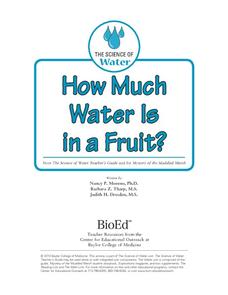Constitutional Rights Foundation
Women in the Military
Scholars analyze the role of women in the military in United States history. Using group research, debate, and diary entries, they explore various military activity in America. To complete the lesson, young historians write an essay...
Baylor College
Can Nutrients in Water Cause Harm?
Ecology candidates culture pond water organisms over a few days time, then they experiment to find out how increasing nutrients affects the population. As part of a unit on water, this exploration gives your class an understanding of how...
Baylor College
Finding the Carbon in Sugar
In session one, demonstrate for your class how a flame eventually goes out when enclosed in a jar in order to teach that oxygen is required for combustion. In session two, class members then burn sugar in a spoon to observe how it...
Baylor College
What Dissolves in Water?
One of water's claims to fame is as the universal solvent. Young physical scientists experiment to discover which materials dissolve in this special compound. You could never be more prepared for teaching this lesson than by using this...
Baylor College
How Much Water Is in a Fruit?
Compare the volume of an orange to the volume of liquid that can be extracted out of it. Also compare the mass of an apple before and after it has been dried out. In both of these activities, children find that there is an appreciable...
Baylor College
About Air
Give your class a colorful and tasty representation of the components of the mixture that we call air. Pop a few batches of popcorn in four different colors, one to represent each gas: nitrogen, oxygen, argon, and carbon dioxide. The...
Rainforest Alliance
Protecting the Critical Habitat of the Manatee and Loggerhead Turtle
Explore ocean habitats with a lesson that showcases the home of manatees and loggerhead turtles in Belize. Here, pupils compare and contrast the homes of ocean animals to those of humans, listen to an original short story about the...
Baylor College
Using Heat from the Sun
Let's heat things up! This simple experiment demonstrates for young scholars the important role the sun plays in providing the earth with energy. Place one cup of water in direct sunlight and one in shade, then take measurements in order...
Baylor College
Modeling Earth's Atmosphere
Life on Earth is made possible by the unique composition of its atmosphere. Working collaboratively, a scale model is created as young scientists learn about the different layers of gas that surround the planet. Cards are included that...
Baylor College
What Makes Water Special?
Get close up and personal with a drop of water to discover how the polarity of its molecules affect its behavior. Elementary hydrologists split and combine water droplets, and also compare them to drops of oil. Much neater than placing a...
Baylor College
What Is a One Part Per Million Solution?
Water may appear to be crystal clear, but there could be dissolved substances present. Lab groups make a one-part-per-million of a food coloring solution to demonstrate this concept. As part of an outstanding unit about water, this...
Baylor College
Heart and Lungs
With a partner, youngsters measure their pulse and breathing rates, both at rest and after running in place for a minute. While this activity is not novel, the lesson plan includes a large-scale classroom graphing activity and other...
Baylor College
Dust Catchers
In class, your emerging environmentalists construct dust catchers. They take them home for a week or two, and then bring them back into class to examine under a magnifier. From this activity, they learn what makes up dust and that...
Baylor College
Moving Air
In lab groups, young scientists place aluminum cans with a bubble-solution cap into different temperatures of water to see what size of bubble dome forms. As part of an atmosphere unit in preparation for learning about convection...
Baylor College
Lungometer
Life science learners construct lung-o-meters from gallon-sized milk jugs and then measure their lung capacities. For older students, have them graph the vital lung capacities of each person in the class. Cross-curricular pieces are...
Baylor College
Water: Post-Assessment
Very simply, the science class will discuss what they have learned during The Science of Water unit and take a multiple-choice post-assessment quiz. A few other closing activities are suggested for you to choose from, such as having...

















